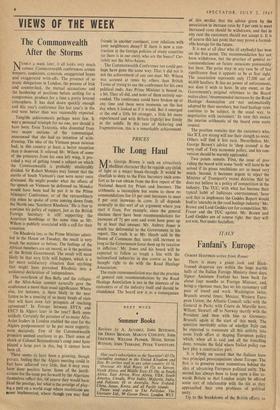VIEWS OF THE WEEK
The Commonwealth After the Storms
NEARLY a .week later, it all looks very much calmer. Commonwealth conferences arouse tempers, suspicions, cynicism, exaggerated hopes and exaggerated write-offs. The presence of so many delegations in London, the process of leak and counter-leak, the mutual accusations and the hardening of positions before settling for a compromise, produce for a time a pretty fevered atmosphere. It has died down quickly enough and this year's conference like last year's in the end went better than was reasonably expected.
Tangible achievements perhaps were few. It wawa personal triumph for no one, nor should it have been. Even Tanzania, who dissented from two major sections of the communiqué, announced that she had no intention of with- drawing. The idea of the Vietnam peace mission had; in this country at least, a better reception than it deserved. It relieved Mr. Wilson of some of the pressures from his own left wing, it pro- vided• a way of getting round a subject on which the Commonwealth is probably unalterably divided. Sir Robert Menzies may lament that the merits of South Vietnam's case were never once, discussed. He might ponder what the effects of the 'speech on Vietnam he delivered on Monday would have been had he put it to the Prime Ministers' Conference,' or of the extraordinary slip when he spoke of arms coming down from the North into 'Southern-Rhodesia.' He is free to continue his policy of support, just as the British Foreign Secretary is still supporting the American bombings at the same time as Mr. Wilson is publicly associated with a call for their cessation.
On Rhodesia too, as the Prime Minister admit- ted in the House on Tuesday, the result is very much the mixture as before. The feelings of the African members are on record, so is the position of the British Government. The result will most likely be that very little will happen, which is a far more satisfactory situation than anything that might have provoked Rhodesia into a unilateral declaration of independence.
The overthrow of Ben Bella and the collapse of the Afro-Asian summit naturally gave the conference a more than usual significance. Where else, for instance, is there likely in the near future to be a meeting of so many heads of state that will have even fair prospects of reaching agreement? In Europe between EFTA and EEC? In Algiers later in the year? Both seem unlikely. Certainly the presence of so many Afro- Asian leaders in London enabled the case for the Algiers postponement to be put more cogently, even decisively. Few of the Commonwealth premiers seemed overkeen to go. Their sense of shock at Colonel Boumedienne's coup must have played a large part in this, but it cannot have been all.
There seems to have been a growing, though private, feeling that the Algiers meeting could in fact have achieved very little, that it may even have done positive harm. Some of the justifi- cations for the coup put forward by the Algerians themselves reflect this. Of course they would have liked the prestige, but what is the prestige of play- ing a part on a world stage where resolutions are sever implemented, where though you may find friends in another continent, your relations with your neighbours decay? If there is now a con- traction in the foreign policies of many countries (as there is in our own), who are the losers? Cer- tainly not the Afro-Asians.
The Commonwealth Conference too could per- haps have gone the same way. That it did not is not the achievement of any one man. Mr. Wilson was accused at times by others than British Tories of trying to use the conference for his own political ends. Any Prime Minister is bound to, a bit. They all did, and none of them entirely suc- ceeded. The conference could have broken up at any time and there were moments on the last day when it looked as if it would. But it emerged at the end a little bit stronger, a little bit more experienced and with Britain (rightly) less firmly in the saddle. In this year of bickering and fragmentation, this is a remarkable achievement.










































 Previous page
Previous page